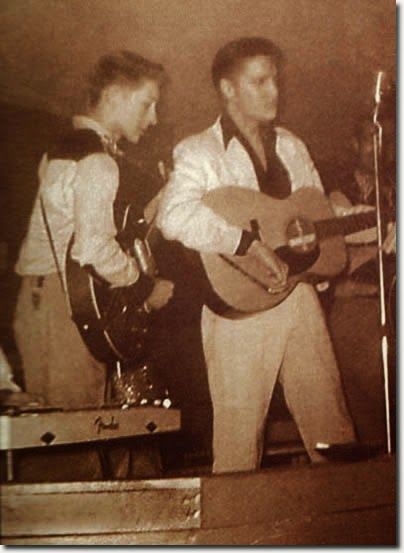
Date: July 5, 1954. Time: Approximately 11 P.M. Recording Engineer and Producer of “That’s All Right”: Sam Phillips, age 31. Musical Performers: Elvis Presley, age 18, vocal and acoustic rhythm guitar; Scotty Moore, age 23, electric guitar; Bill Black, age 27, acoustic stand-up bass fiddle.
Date: July 6, 1954. Time: Approximately 9 P.M. Recording Engineer and Producer of “Blue Moon of Kentucky”: Sam Phillips. Musical Performers: Elvis Presley, vocal and acoustic rhythm guitar; Scotty Moore, electric guitar; Bill Black, acoustic stand-up bass fiddle.
Recorded at Sun Recording Studio, 706 Union Avenue, Memphis, TN. Presley grew up in Mississippi and in Tennessee. Moore and Black grew up in Tennessee. Phillips grew up in Alabama.
Sam Phillips was born in the year 1923 on his family’s 200 acre mortgaged farm near Florence, Alabama. He attended Coffee High School in Florence where he played the tuba, trombone and drums, and led the Coffee High marching band. The family lost their farm in the great depression. Phillips’ father died soon thereafter. Phillips left school and went to work to support the family. At age 19, Sam met his future wife Rebecca Burns while they were both employed at Sheffield, AL radio station WLAY. He was a radio announcer, she was a featured singer with a regular radio spot on the radio station. Phillips told an interviewer many years later that “I fell in love with Becky’s voice before I even met her”. They were married in 1943. The marriage lasted 60 years until Sam’s death in 2003 at age 80. Rebecca died at age 87 in 2012. In 1945, Sam and Rebecca moved to Memphis where Sam worked as a radio announcer and sound engineer for WREC radio.

In late 1949, Phillips leased an irregularly configured commercial space located next door to a diner at 706 Union Avenue in Memphis. The space had been used for many years as an automobile glass repair shop. It had a tin ceiling. Phillips converted it into a recording studio, removing the tin ceiling and installing acoustic tiles. His recording components consisted of a used RCA tube radio control console, a used lathe cutting recorder, and a few used Altec, RCA and Shure microphones. Phillips discovered the natural echo and reverb spots in the space by drawing a grid and walking through the space, lengthwise and widthwise, foot by foot, clapping his hands, listening, and marking the spots that produced more or less natural reverb and echo. He then used the grid to guide him in positioning the singers and players, and the microphones, to produce the desired sound. He founded the Sun record label in 1952. Phillips was the first to record B.B. King, Junior Parker, and Howlin’ Wolf. He also recorded Ike Turner, James Cotton, Rufus Thomas, Bobby Bland, Rosco Gordon, and Little Milton in the early 1950s. In early 1954, Phillips purchased two state of the art Ampex 350 tape recorders. Using these tape decks, Phillips developed his own version of a “tape delay” kind of echo. He used the two tape machines to record the performance. Then he played back one of the recordings slightly later than the other, creating the echo. If you listen to the two attached recordings, you will hear the difference between That’s All Right and Blue Moon of Kentucky. Phillips used the tape echo delay on Blue Moon and he did not use it on That’s All Right.
Although it was not positively documented, the rhythm guitar played by Elvis on these recordings was his Kay guitar, purchased by his mother at Tupelo Hardware for his 11th birthday in 1946, price approximately $15. Most if not all Elvis biographers agree that this was the only guitar he had access to. It was one of his few worldly possessions. It sounds pretty good on these recordings. We know for sure that Scotty Moore played his Gibson ES-295 on these recordings. Moore was still in possession of this guitar at the time of his death in 2016 at age 84. The current owner of Bill Black’s bass fiddle is Paul McCartney. His wife Linda purchased it in the late 1970s and gave it to him as a birthday gift. In late 1954, Elvis purchased a used Martin 000-18, a Martin D-18, and in 1955, a Martin D-28. Over the years, certain persons have claimed to own the Kay Guitar and offer it for sale at an astronomical price , but none have been able to establish enough provenance to get any bids.
Presley, Moore, Black and Phillips had this in common: They did things differently. Sam Phillips’ oft-repeated motto was: “If you are not doing something different, you are not doing anything at all”. It goes without saying that these cover recordings, one of a 1940s blues record, the other of a 1940s bluegrass waltz, are certainly neither blues or bluegrass. They are new and different, played and sung with emotion, at a fast speed, with joy and enthusiasm, by an 18 year old poor boy who was brought up in a Pentecostal Assembly of God church, who listened and learned from the sounds he heard on the radio, the juke boxes, his neighborhood, the southern gospel quartets and piano players at Memphis’ Ellis Auditorium, and his church.
Bill Black died in 1965 from a brain tumor at age 39. The last time that Elvis and Scotty performed together, or saw each other, was during the 1968 Elvis Comeback television broadcast.
Elvis died in 1977 at age 42.
Rock on!
Mike
